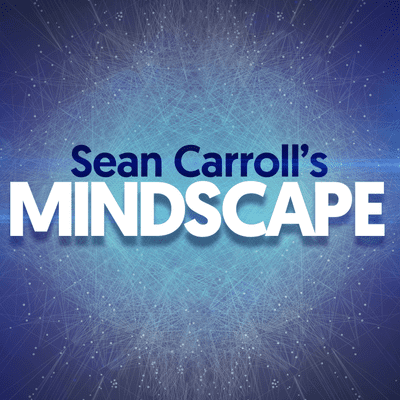
Sean Carroll's Mindscape: Science, Society, Philosophy, Culture, Arts, and Ideas
engelsk
Historie & religion
Begrænset tilbud
2 måneder kun 19 kr.
Derefter 99 kr. / månedOpsig når som helst.
- 20 lydbogstimer pr. måned
- Podcasts kun på Podimo
- Gratis podcasts
Læs mere Sean Carroll's Mindscape: Science, Society, Philosophy, Culture, Arts, and Ideas
Ever wanted to know how music affects your brain, what quantum mechanics really is, or how black holes work? Do you wonder why you get emotional each time you see a certain movie, or how on earth video games are designed? Then you’ve come to the right place. Each week, Sean Carroll will host conversations with some of the most interesting thinkers in the world. From neuroscientists and engineers to authors and television producers, Sean and his guests talk about the biggest ideas in science, philosophy, culture and much more.
Alle episoder
422 episoder339 | Ned Block on Whether Consciousness Requires Biology
It's become increasingly clear that the Turing Test -- determining whether human interlocutors can tell whether a conversation is being carried out by a human or a machine -- is not a good way to think about consciousness. Modern LLMs can mimic human conversation with extraordinary verisimilitude, but most people would not judge them to be conscious. What would it take? Is it even possible for a computer program to achieve consciousness, or must consciousness be fundamentally "meat-based"? Philosopher Ned Block has long argued that consciousness involves something more than simply the "functional" aspects of inputs and outputs. Blog post with transcript: https://www.preposterousuniverse.com/podcast/2026/01/05/339-ned-block-on-whether-consciousness-requires-biology/ [https://www.preposterousuniverse.com/podcast/2026/01/05/339-ned-block-on-whether-consciousness-requires-biology/] Support Mindscape on Patreon [https://www.patreon.com/seanmcarroll]. Ned Block received his Ph.D. in philosophy from Harvard University. He is currently Silver Professor in the Department of Philosophy at New York University, with secondary appointments in Psychology and Neural Science. He is also co-director of the Center for Mind, Brain, and Consciousness [https://wp.nyu.edu/consciousness/]. He is Past President of the Society for Philosophy and Psychology and was elected a Fellow of the American Academy of Arts & Sciences. * Web site [https://www.nedblock.us/] * NYU web page [https://as.nyu.edu/faculty/ned-block.html] * PhilPeople profile [https://philpeople.org/profiles/ned-block] * Google Scholar publications [https://scholar.google.com/citations?user=0pZiZ7wAAAAJ&hl=en] * Wikipedia [https://en.wikipedia.org/wiki/Ned_Block] See Privacy Policy at https://art19.com/privacy [https://art19.com/privacy] and California Privacy Notice at https://art19.com/privacy#do-not-sell-my-info [https://art19.com/privacy#do-not-sell-my-info].
Holiday Message 2025 | The Romance of the University
Time for the holiday message! Rounding off the year with a brief and casual reflection on some issue that doesn't quite rise to the level of a full solo podcast. And hopefully something uplifting. This year, I offer a short apologia for higher education in the liberal arts and sciences, focusing not on the down-to-earth economic/occupational benefits of a college degree, but on the very real ways in which such an education opens up possibilities for personal growth. I think all of us in academia should be loud and unapologetic about the more romantic, idealistic values of the modern university. Happy holidays all! Blog post with transcript: https://www.preposterousuniverse.com/podcast/2025/12/22/holiday-message-2025-the-romance-of-the-university/ [https://www.preposterousuniverse.com/podcast/2025/12/22/holiday-message-2025-the-romance-of-the-university/] Support Mindscape on Patreon [https://www.patreon.com/seanmcarroll]. See Privacy Policy at https://art19.com/privacy [https://art19.com/privacy] and California Privacy Notice at https://art19.com/privacy#do-not-sell-my-info [https://art19.com/privacy#do-not-sell-my-info].
AMA | December 2025
Welcome to the December 2025 Ask Me Anything episode of Mindscape! These monthly excursions are funded by Patreon supporters [https://www.patreon.com/seanmcarroll] (who are also the ones asking the questions). We take questions asked by Patreons, whittle them down to a more manageable number -- based primarily on whether I have anything interesting to say about them, not whether the questions themselves are good -- and sometimes group them together if they are about a similar topic. Blog post with transcript: https://www.preposterousuniverse.com/podcast/2025/12/15/ama-december-2025/ [https://www.preposterousuniverse.com/podcast/2025/12/15/ama-december-2025/] In the intro I give a plug for the Pods Fight Poverty effort organized by GiveDirectly [https://www.givedirectly.org/podsfightpoverty/]. Please consider making a donation to help families in Rwanda! Enjoy! See Privacy Policy at https://art19.com/privacy [https://art19.com/privacy] and California Privacy Notice at https://art19.com/privacy#do-not-sell-my-info [https://art19.com/privacy#do-not-sell-my-info].
338 | Ryan Patterson on the Physics of Neutrinos
The story goes that Wolfgang Pauli, who first proposed the existence of neutrinos, was embarrassed to have done so, as it was considered uncouth to hypothesize new particles that could not be detected. Modern physicists have no such scruples, of course, but more importantly neutrinos turn out to be very detectable, given sufficient resources and experimental technique. I talk with neutrino physicist Ryan Patterson about what current and upcoming experiments teach us about neutrinos themselves, as well as implications for dark matter and why there are more particles than antiparticles in the universe. Blog post with transcript: https://www.preposterousuniverse.com/podcast/2025/12/08/228-ryan-patterson-on-the-physics-of-neutrinos/ [https://www.preposterousuniverse.com/podcast/2025/12/08/228-ryan-patterson-on-the-physics-of-neutrinos/] Support Mindscape on Patreon [https://www.patreon.com/seanmcarroll]. Ryan Patterson received his Ph.D. in physics from Princeton University. He is currently Professor of Physics at Caltech. His research involves a number of aspects of experimental neutrino physics, including involvement in the NOvA [https://novaexperiment.fnal.gov/] and DUNE [http://www.dunescience.org/] experiments. * Caltech web page [https://www.its.caltech.edu/~rbpatter/] * Publications at inSpire [https://inspirehep.net/authors/1046583?ui-citation-summary=true] See Privacy Policy at https://art19.com/privacy [https://art19.com/privacy] and California Privacy Notice at https://art19.com/privacy#do-not-sell-my-info [https://art19.com/privacy#do-not-sell-my-info].
337 | Kevin Zollman on Game Theory, Signals, and Meaning
Game theory is a way of quantitatively describing what happens any time one thing interacts with another thing, when both things have goals and potential rewards. That's a pretty broad class of interesting events, so it is unsurprising that game theory is a useful way of thinking about everything from international relations to the evolution of peacock feathers. I talk with philosopher Kevin Zollman about what game theory is and how it gets used in biology and human interactions. We discuss how thinking in game-theoretic terms can help understand the origin of meaning and intentionality in human language. Blog post with transcript: https://www.preposterousuniverse.com/podcast/2025/12/01/337-kevin-zollman-on-game-theory-signals-and-meaning/ [https://www.preposterousuniverse.com/podcast/2025/12/01/337-kevin-zollman-on-game-theory-signals-and-meaning/] Support Mindscape on Patreon [https://www.patreon.com/seanmcarroll]. Kevin Zollman received his Ph.D. in philosophy from the University of California, Irvine. He is currently the Herbert A. Simon Professor of Philosophy and Social and Decision Sciences in the Department of Philosophy at Carnegie Mellon University. He is also an associate fellow at the Center for Philosophy of Science at the University of Pittsburgh, and a visiting professor at the Munich Center for Mathematical Philosophy. He serves as the Director of the Institute for Complex Social Dynamics [https://www.cmu.edu/dietrich/social-dynamics/] at CMU. He is the co-author, with Paul Raeburn, of The Game Theorist's Guide to Parenting [https://www.amazon.com/Game-Theorists-Guide-Parenting-Negotiators-ebook/dp/B015CLB53M/]. * Web site [https://www.kevinzollman.com/] * CMU web page [https://www.cmu.edu/dietrich/philosophy/people/faculty/kevin-zollman.html] * Google Scholar publications [https://scholar.google.com/citations?user=XMu62aQAAAAJ&hl=en&oi=ao] * PhilPeople profile [https://philpeople.org/profiles/kevin-zollman] See Privacy Policy at https://art19.com/privacy [https://art19.com/privacy] and California Privacy Notice at https://art19.com/privacy#do-not-sell-my-info [https://art19.com/privacy#do-not-sell-my-info].
Vælg dit abonnement
Begrænset tilbud
Premium
20 timers lydbøger
Podcasts kun på Podimo
Gratis podcasts
Opsig når som helst
2 måneder kun 19 kr.
Derefter 99 kr. / måned
Premium Plus
100 timers lydbøger
Podcasts kun på Podimo
Gratis podcasts
Opsig når som helst
Prøv gratis i 7 dage
Derefter 129 kr. / month
2 måneder kun 19 kr. Derefter 99 kr. / måned. Opsig når som helst.

































